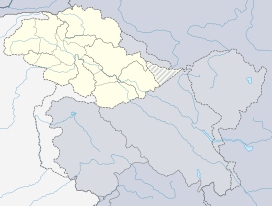Great Trango Tower
| Trango Towers | |
|---|---|
| ٹرینگو ٹاورز | |

Trango Towers — Their vertical faces are the world's tallest cliffs. Trango Tower center; Trango Monk center left; Trango II far left; Great Trango right.
|
|
| Highest point | |
| Elevation | 6,286 m (20,623 ft) |
| Prominence | approx. 800 metres (2,625 ft) |
| Coordinates | 35°46′N 76°11′E / 35.767°N 76.183°ECoordinates: 35°46′N 76°11′E / 35.767°N 76.183°E |
| Geography | |
| Parent range | Baltoro Muztagh, Karakoram |
| Geology | |
| Mountain type | Granite |
| Climbing | |
| First ascent | 1977 by Galen Rowell, John Roskelley, Kim Schmitz and Dennis Hennek |
| Easiest route | Northwest face: snow/ice/rock climb |
The Trango Towers (Urdu: ٹرینگو ٹاورز) are a family of rock towers situated in Gilgit-Baltistan, in the north of Pakistan. The Towers offer some of the largest cliffs and most challenging rock climbing in the world, and every year a number of expeditions from all corners of the globe visit Karakoram to climb the difficult granite. They are located north of Baltoro Glacier, and are part of the Baltoro Muztagh, a sub-range of the Karakoram range. The highest point in the group is the summit of Great Trango Tower at 6,286 m (20,623 ft), the east face of which features the world's greatest nearly vertical drop.
All of the Trango Towers lie on a ridge, trending northwest-southeast, between the Trango Glacier on the west and the Dunge Glacier on the east. Great Trango itself is a large massif, with four identifiable summits: Main (6,286 m (20,623 ft)), South or Southwest (6,250 m (20,510 ft)), East (6,231 m (20,443 ft)), and West (6,223 m (20,417 ft)). It is a complex combination of steep snow/ice gullies, steeper rock faces, and vertical to overhanging headwalls, topped by a snowy ridge system.
Just northwest of Great Trango is the Trango Tower (6,239 m (20,469 ft)), often called "Nameless Tower". This is a very large, pointed, rather symmetrical spire which juts 1,000 m (3,300 ft) out of the ridgeline. North of Trango Tower is a smaller rock spire known as "Trango Monk." To the north of this feature, the ridge becomes less rocky and loses the large granite walls that distinguish the Trango Towers group and make them so attractive to climbers; however the summits do get higher. These summits are not usually considered part of the Trango Towers group, though they share the Trango name. Trango II (6,237 m (20,463 ft)) lies northwest of the Monk, and the highest summit on the ridge, Trango Ri (6,363 m (20,876 ft)), lies northwest of Trango II.
...
Wikipedia


